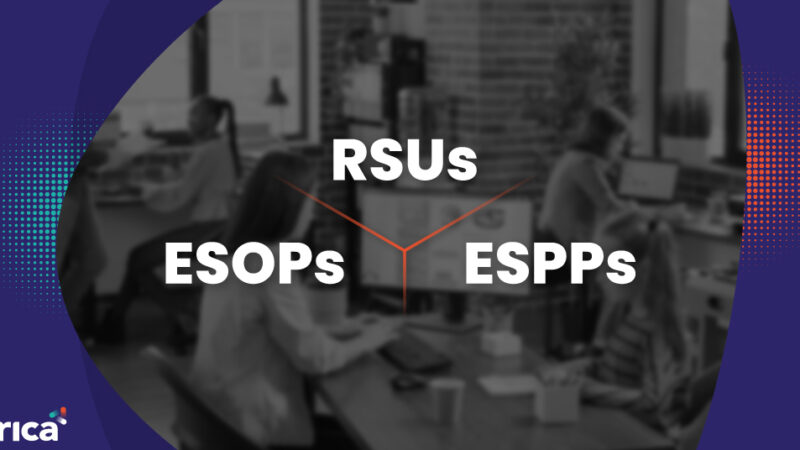
What Is Equity-Based Compensation, and How Does It Work?
The year 2022 proved to be beneficial for startup employees who had received equity-based compensation as part of their pay packages. According to a report, employees benefited to the tune of $196 Million through ESOPs (Employee Stock Option Plan) buyback programs instituted by their companies, which gave employees an option to sell their vested shares and benefit monetarily. Employees could also hold on to their equity, and benefit from its sale in the future.
Either way, equity-based compensation presents a lucrative opportunity for employees, incentivising them to stay at a company. In this article, we explore how startups can leverage equity-based compensation as a long-term recruitment and retention tool along with various types of equity compensation models.
What Is Equity-Based Compensation?
In equity-based compensation, a contract is established between the company and the employee, giving the employees the right to purchase company shares at a fixed price upon satisfying certain pre-established conditions. These conditions can vary from working at the company for a certain time frame to achieving specific milestones.
There are several models that companies can choose from when establishing their equity-based compensation framework. The benefits of offering equity-based compensation for employees include the opportunity for monetary gains as well as a greater stake in the business. Additionally, startups can retain their employees for a longer period and accelerate the achievement of business goals.
Key Terminology
Here’s a snapshot of common terminology used to describe the various equity-based compensation models:
- ESOP – The Employee Stock Option Plan that enables employees to purchase the company stock and become shareholders in the business.
- Vesting – The process by which the employee earns the option to purchase the stock.
- Vesting Period – The time frame during which the employee needs to fulfill pre-determined conditions to be eligible to enjoy the benefits of their equity-based compensation plan.
- Exercise – The process of purchasing the shares once the stock is vested.
- Exercise period – The time frame during which the employee must exercise the stock option after the vesting period is over.
- Exercise Price – The price at which an employee purchases a share.
- Grant/strike price – The predetermined price at which the employee can buy company shares when exercising the stock options.
Types of Equity-Based Compensation
Equity-based compensation is not a one-size-fits-all. There are several options, and companies must choose the right fit to reap substantial benefits.
Stock Options
This is one of the most basic types of equity-based compensation. Essentially, companies offer employees (or potential employees) the right to buy shares of the company’s stock at a predetermined price, which is typically lower than the market price.
Once the option vests, the employee can exercise the option. Stock options have emerged as a key strategy to attract fresh hires and retain existing employees. There are two types of stock options.
- Incentive stock options (ISOs)
The ISOs are stock options that come with tax benefits and are often given to highly valued employees. The recipient of ISOs has the opportunity to purchase shares at a much lower exercise price than the market price, thus creating a potential for significant monetary benefit.
Within one year of exercising them, the profits will be taxed as ordinary income. However, if they are sold after one year, the profits are taxed as capital gains.
- Non-qualified stock options (NSOs)
The NSOs, unlike ISOs, do not come with tax privileges. When the employees exercise these shares, they need to pay taxes on the difference between the grant price and the exercise price. This amount is taxed as ordinary income or a combination of ordinary income and capital gains. Hence, NSOs are a much more commonly awarded stock option than ISO.
Restricted Stock
When offering restricted stock, a company promises to offer shares to an employee after certain conditions are met. Within this category, Restricted Stock Units (RSUs) are awarded by the company typically to high-level executives after being at the company for a certain amount of time; they do not need to be purchased.
On the other hand, Restricted Stock Awards (RSAs) are offered to employees placed lower in the hierarchy upon satisfying certain conditions. If the conditions are not met, RSAs can be forfeited.
Performance Shares
This is a type of contract where stock options are granted to managers and executives based on their ability to achieve certain performance-related goals.
The performance is usually tied to their ability to increase return on investment and create more value for shareholders. These shares are awarded as payment for achieving these critical milestones that accelerate a company’s success trajectory.
Building a Strategic Plan
Equity-based compensation plans need to be strategically designed for companies to reap the maximum benefit for their businesses. The plan may vary for employees based on their skill set, seniority, the company’s cash flow, and the growth stage of the company.
Newer startups will require a completely different plan as compared to those who have raised funds. No matter what stage, the company will need to continue adapting its stock option strategies to align with company goals.
The Takeaway
It is in the best interest of startups to frame their equity-based compensation policies, keeping a wide range of factors in mind. Ad hoc decisions can impact the future sustainability and profitability of the business, leading to cash flow problems.
It is advisable for startups to partner with a specialist who understands the inner workings of stock options and helps companies come up with a long-term strategy to leverage stock options as a successful retention and hiring strategy.
trica, a state-of-the-art stock options management tool, is leveraged by startups to build a superior experience when issuing stock options programs. This end-to-end solution is an excellent investment for businesses looking to hire and retain the best talent.
Book a demo today to know more!
ESOP & CAP Table
Management simplified
Get started for free





